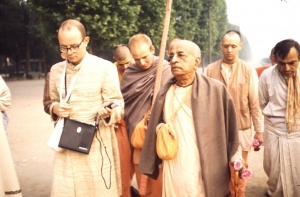SB 7.7.48: Difference between revisions
No edit summary |
(Vanibot #0054 edit - transform synonyms into clickable links, which search similar occurrences) |
||
| Line 23: | Line 23: | ||
<div class="synonyms"> | <div class="synonyms"> | ||
''tasmāt'' | ''[//vanipedia.org/wiki/Special:VaniSearch?s=tasmāt&tab=syno_o&ds=1 tasmāt]'' — therefore; ''[//vanipedia.org/wiki/Special:VaniSearch?s=arthāḥ&tab=syno_o&ds=1 arthāḥ]'' — ambitions for economic development; ''[//vanipedia.org/wiki/Special:VaniSearch?s=ca&tab=syno_o&ds=1 ca]'' — and; ''[//vanipedia.org/wiki/Special:VaniSearch?s=kāmāḥ&tab=syno_o&ds=1 kāmāḥ]'' — ambitions for satisfaction of the senses; ''[//vanipedia.org/wiki/Special:VaniSearch?s=ca&tab=syno_o&ds=1 ca]'' — also; ''[//vanipedia.org/wiki/Special:VaniSearch?s=dharmāḥ&tab=syno_o&ds=1 dharmāḥ]'' — duties of religion; ''[//vanipedia.org/wiki/Special:VaniSearch?s=ca&tab=syno_o&ds=1 ca]'' — and; ''[//vanipedia.org/wiki/Special:VaniSearch?s=yat&tab=syno_o&ds=1 yat]'' — upon whom; ''[//vanipedia.org/wiki/Special:VaniSearch?s=apāśrayāḥ&tab=syno_o&ds=1 apāśrayāḥ]'' — dependent; ''[//vanipedia.org/wiki/Special:VaniSearch?s=bhajata&tab=syno_o&ds=1 bhajata]'' — worship; ''[//vanipedia.org/wiki/Special:VaniSearch?s=anīhayā&tab=syno_o&ds=1 anīhayā]'' — without desire for them; ''[//vanipedia.org/wiki/Special:VaniSearch?s=ātmānam&tab=syno_o&ds=1 ātmānam]'' — the Supersoul; ''[//vanipedia.org/wiki/Special:VaniSearch?s=anīham&tab=syno_o&ds=1 anīham]'' — indifferent; ''[//vanipedia.org/wiki/Special:VaniSearch?s=harim&tab=syno_o&ds=1 harim]'' — the Supreme Personality of Godhead; ''[//vanipedia.org/wiki/Special:VaniSearch?s=īśvaram&tab=syno_o&ds=1 īśvaram]'' — the Lord. | ||
</div> | </div> | ||
Latest revision as of 23:06, 18 February 2024

A.C. Bhaktivedanta Swami Prabhupada
TEXT 48
- tasmād arthāś ca kāmāś ca
- dharmāś ca yad-apāśrayāḥ
- bhajatānīhayātmānam
- anīhaṁ harim īśvaram
SYNONYMS
tasmāt — therefore; arthāḥ — ambitions for economic development; ca — and; kāmāḥ — ambitions for satisfaction of the senses; ca — also; dharmāḥ — duties of religion; ca — and; yat — upon whom; apāśrayāḥ — dependent; bhajata — worship; anīhayā — without desire for them; ātmānam — the Supersoul; anīham — indifferent; harim — the Supreme Personality of Godhead; īśvaram — the Lord.
TRANSLATION
The four principles of advancement in spiritual life—dharma, artha, kāma and mokṣa—all depend on the disposition of the Supreme Personality of Godhead. Therefore, my dear friends, follow in the footsteps of devotees. Without desire, fully depend upon the disposition of the Supreme Lord and worship Him, the Supersoul, in devotional service.
PURPORT
These are words of intelligence. Everyone should know that in every stage of life we are dependent upon the Supreme Personality of Godhead. Therefore the dharma, religion, which we accept should be that which is recommended by Prahlāda Mahārāja-bhāgavata-dharma. This is the instruction of Kṛṣṇa: sarva-dharmān parityajya mām ekaṁ śaraṇaṁ vraja (BG 18.66). To take shelter of the lotus feet of Kṛṣṇa means to act according to the rules and regulations of bhāgavata-dharma, devotional service. As far as economic development is concerned, we should discharge our occupational duties but fully depend on the lotus feet of the Lord for the results. Karmaṇy evādhikāras te mā phaleṣu kadācana: "You have a right to perform your prescribed duty, but you are not entitled to the fruits of action." According to one's position, one should perform his duties, but for the results one should fully depend upon Kṛṣṇa. Narottama dāsa Ṭhākura sings that our only desire should be to perform the duties of Kṛṣṇa consciousness. We should not be misled by the karma-mīmāṁsā philosophy, which concludes that if we work seriously the results will come automatically. This is not a fact. The ultimate result depends upon the will of the Supreme Personality of Godhead. In devotional service, therefore, the devotee completely depends upon the Lord and honestly performs his occupational duties. Therefore Prahlāda Mahārāja advised his friends to depend completely on Kṛṣṇa and worship Him in devotional service.